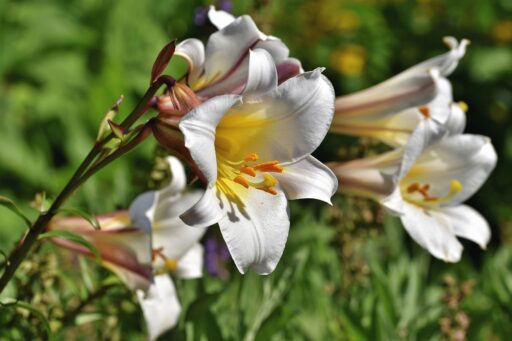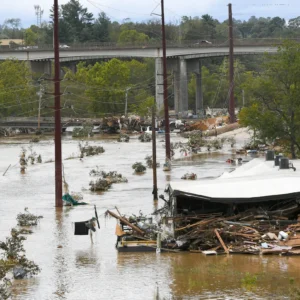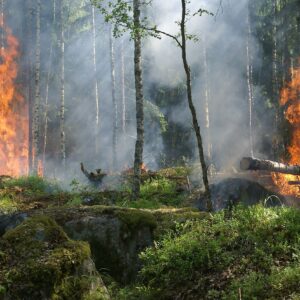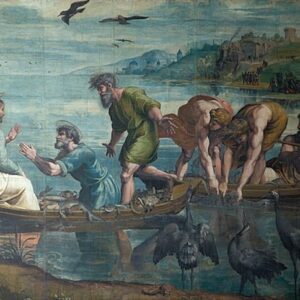I am writing this post in the great Wolverine Brewing Company, because I have returned home from several weeks’ travel to find my city smashed yet again by storms which the power grid was not built to withstand. It was not built to withstand them, because storms of this frequency and ferocity are the result of anthropogenic climate change, which is gradually—or not so gradually for some people, in some places—changing the way we live and think, including how we conceive religion.
I recently read Karen Armstrong’s Sacred Nature (Knopf, 2022). In her youth, Armstrong was a Roman Catholic nun. She left the order, and the religion in an institutional sense. I have no critique to make of personal convictions, and I very much value the project of Sacred Nature. In the book, Armstrong seeks to weave together strands from the world’s major religions to envision a more wholesome and sustainable spirituality than…whatever it is that has got us to the present situation.
Some believe there is a fatal flaw at the heart of Judaism and Christianity, in particular the creation story shared by the religions, which is at the root of the many-sided Ecological Crisis. This idea has been prevalent since Lynn White Jr.’s famous 1967 paper “The Historical Roots of Our Ecological Crisis,” and Armstrong seems to endorse it. I agree that the Ecological Crisis is of Western origin. And like Armstrong, I am eclectic when it comes to religion. I am a Christian, but I would also say the practice of Tai Chi and other martial arts and certain breathing and meditation techniques that come out of Chinese culture are an essential part of my spirituality—to risk a potentially vague and vapid term. I’ve learned from these East Asian arts things about embodiment and—to now risk grandiloquence—cosmic or natural laws that I have been unable to learn from Western sources.
But when Armstrong writes “Nature does not figure prominently in Judaism and Christianity,” in a chapter which looks mainly at Islam (she goes on to imply this is not the case in Islam and that in that religion, unlike in the other two, nature is a revelation on par with the Qur’an—which is of course also what Jews and Christians believe about the Bible and nature)—when she makes such a sweeping statement, I balk. And it makes no sense coming from her, since she has already at that point in the book acknowledged some fascinating and profound ways in which Jewish and Christian tradition engage the natural world.
When I read that line, I was reminded of a project I’ve been thinking about for some time, since I first read this passage in one of Wendell Berry’s essays collected in The Agrarian Reader:
“I don’t think it is enough appreciated how much an outdoor book the Bible is. It is a ‘hypaethral book,’ such as Thoreau talked about—a book open to the sky. It is best read and understood outdoors, and the farther outdoors the better. Or that has been my experience of it. Passages that within walls seem improbable or incredible, outdoors seem merely natural. This is because outdoors we are confronted everywhere with wonders; we see that the miraculous is not extraordinary but the common mode of existence. It is our daily bread. Whoever really has considered the lilies of the field or the birds of the air and pondered the improbability of their existence in this warm world within the cold and empty stellar distances will hardly balk at the turning of water into wine—which was, after all, a very small miracle. We forget the greater and still continuing miracle by which water (with soil and sunlight) is turned into grapes.”
I will come back to that passage in a minute, but let me supply the two passages in Thoreau that Berry may have been thinking of, chiefly this one from the journals:
“I thought that one peculiarity of my ‘Week’ was its hypaethral character, to use an epithet applied to those Egyptian temples which are open to the heavens above, under the ether. I thought that it had little of the atmosphere of the house about it, but might wholly have been written, as in fact it was to a considerable extent, out-of-doors.”
Thoreau also used the term in his essay “Life Without Principle”:
“Shall the mind be a public arena, where the affairs of the street and the gossip of the tea-table chiefly are discussed? Or shall it be a quarter of heaven itself—an hypaethral temple, consecrated to the service of the gods?”
A mind, or a book, dedicated to the divine by being placed or written outdoors. Out of what contact with the creation did the books of the Bible come?
Go back to the passage from Berry’s work. He references the miracle at Cana in John’s Gospel, and that is what my project is about. I would like to do, or see someone else do, a close reading of the Bible, or just the Gospels (or any other part of the Bible, Christian or Jewish), highlighting every reference to a natural thing, a creature rather than something made by man. Include the weather and all landscape in this. After all, The foxes have holes, and the birds of the air have nests; but the Son of man hath not where to lay his head. In a sentence like that, I would count not just foxes and birds, but the air itself as an element.
And for that matter, the phrase Son of man is pregnant with meaning: forgive the pun, for I mean that the phrase conjures up birth (‘man’ or adam means humankind, the natural and fleshly human being) and the genealogies that begin two of the Gospels. I would include those genealogies, and any other oblique or straightforward mention of sex and birth, in my own very long list of biblical references to the order of nature.
In fact, it would be an enormous undertaking to list and ponder, if only briefly, every such reference in the Gospels. I could make a book out of that. The entire Bible—well, one thinks of hexameral literature, poetic or learned accounts of the six days of creation. Then there is all the literature which the nature-rich Psalms and Song of Songs have produced. The Law is largely about the right use of the creation….
The invitation I make, then, could produce many books. It has produced many books. But you can do it just for yourself or your own family or faith community: make a list for pondering, a list of your favorite passages in the Bible, no matter how small, that reference the outdoor world, the given world, natural processes, the creation. Perhaps not only such passages, but also those that seem to have been written outdoors and are best read there. In the Gideon’s Bible, at the front, is a list of passages to read when one faces all manner of emotional, spiritual turmoil. Perhaps a list such as I suggest will be of similar aid in the time now facing us all.
Jonathan Geltner lives in Ann Arbor MI with his wife and two sons. His translation of Paul Claudel’s Five Great Odes is available from Angelico Press and a novel, Absolute Music, is available from Slant. If you enjoy his posts at Close Reading, check out his new Substack, Romance and Apocalypse, for more frequent and in-depth essays on the places where literature and other arts meet religious ideas and experience.





